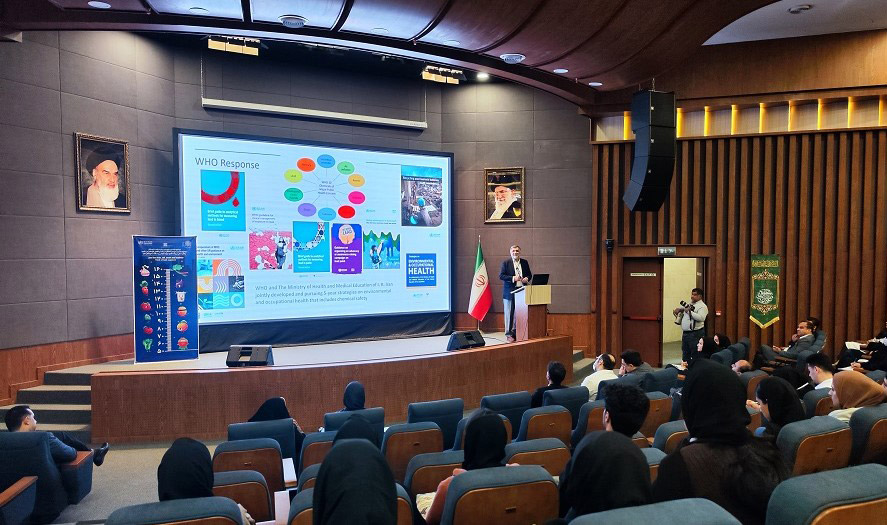 23 October 2023, Tehran, Islamic Republic of Iran – To combat childhood lead poisoning, the WHO Country Office in the Islamic Republic of Iran has teamed up with Shahid Beheshti University of Medical Sciences to mark International Lead Poisoning Prevention Week, from 22 to 28 October 2023. This year’s campaign is “End childhood lead poisoning”, with the partners focusing in this case on efforts in the Islamic Republic of Iran.
23 October 2023, Tehran, Islamic Republic of Iran – To combat childhood lead poisoning, the WHO Country Office in the Islamic Republic of Iran has teamed up with Shahid Beheshti University of Medical Sciences to mark International Lead Poisoning Prevention Week, from 22 to 28 October 2023. This year’s campaign is “End childhood lead poisoning”, with the partners focusing in this case on efforts in the Islamic Republic of Iran.
The collaborative initiative kicked off with a one-day symposium attended by health workers, policy-makers and academic communities. A total of 18 experts, including academics and practitioners in the field, shed light on the various health impacts of lead exposure. They emphasized the critical need for action to safeguard public health, especially among children.
Lead, a well-recognized toxicant, poses a significant threat to human health, affecting the neurological, cardiovascular, gastrointestinal and hematological systems. Children are particularly vulnerable, absorbing 4 to 5 times as much ingested lead as adults from a given source.
In a speech given at the symposium, Dr Syed Jaffar Hussain, WHO Representative and Head of Mission to the Islamic Republic of Iran, underscored the harmful effects of lead, especially on children and on women of childbearing age. He emphasized that there is no known safe level of lead exposure. Fortunately, lead exposure is preventable.
WHO data reveal a sobering statistic: more than 2 million deaths worldwide in 2019 were attributed to chemical exposure, with lead exposure accounting for nearly half of these fatalities. Globally, in 2019, lead exposure further resulted in 21.7 million years lost to disability (disability-adjusted life years, or DALYs). It is estimated that lead exposure was responsible for 30% of the global burden of idiopathic intellectual disability, 4.6% of the global burden of cardiovascular disease and 3% of the global burden of chronic kidney diseases in 2019.
International Lead Poisoning Prevention Week aims to raise awareness about the health effects of lead exposure; showcase efforts by nations and partners to prevent lead exposure, particularly among children; and advocate for further action to eliminate lead paint, through national-level regulatory measures. This campaign builds on the successful ban on the use of lead in petrol as well as progress made by many countries to enact laws to limit lead use in paint, especially in places where children are exposed, such as homes, schools and playgrounds.
Height stickers featuring informative messages about the impact of lead exposure on children’s health were produced and handed out at the symposium to pediatricians, to give to their patients. These stickers bear the message “Lead-Free Kids: Tall, Smart, and Healthier – Think of Lead Exposure” and depict illustrations of fruits and vegetables that decrease lead absorption in the blood. This resource can be used to raise awareness and target the key beneficiaries of this campaign – children.




